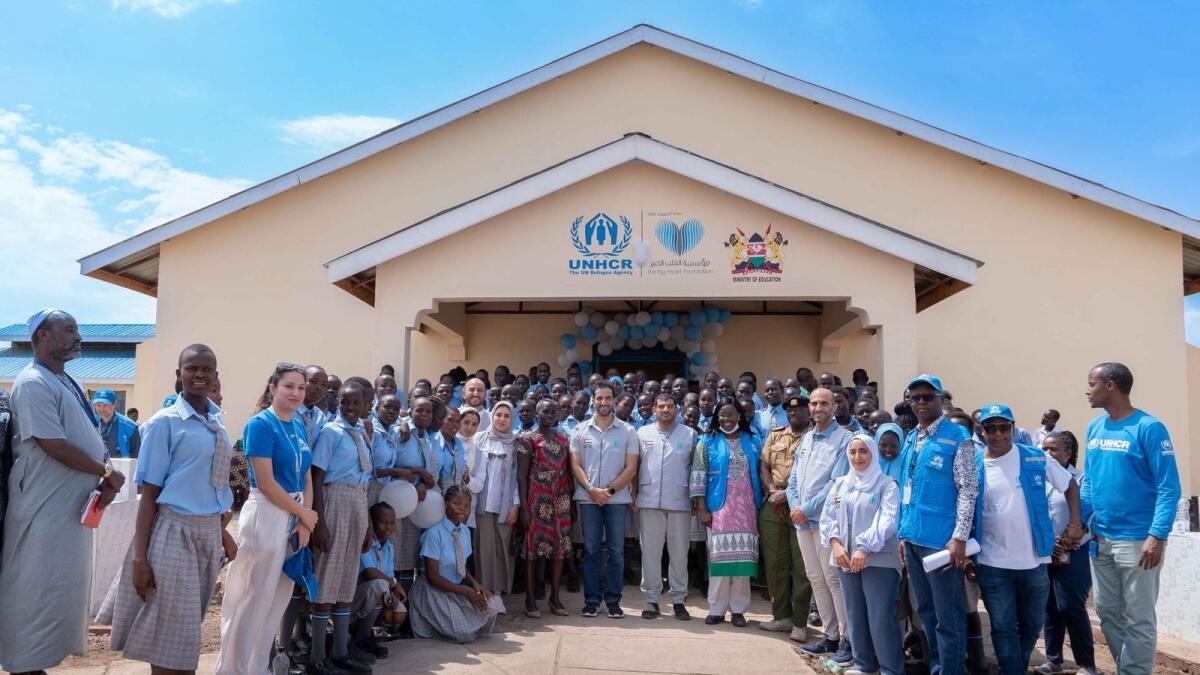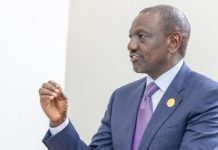Fridah N Kulumba
Africa-Press – Kenya. At the beginning of this month, His Highness Sheikh Sultan bin Ahmed Al Qasimi, Member of the Supreme Council, and Deputy Ruler of Sharjah together with the Humanitarian Envoy of The Big Heart Foundation (TBHF) from the United Arab Emirates (UAE) launched the first-ever Big Heart Secondary Boarding School (BHSS) for girls in Kalobeyei settlement in Kenya that will enrol 360 students every year.
The TBHF school project in Kenya is targeting refugee girls from Kakuma camp, Kalobeyei Integrated Settlement, and those from the surrounding host community in order for them to have access to high-quality education and safe boarding facilities.
It will be funded by the Sharjah Charity House in collaboration with the United Nations High commissioner for Refugees (UNHRC).
Why girls school
According to the research, there is a wider gap in the secondary education requirements of girls in the target community in Kenya.
The statics shows that in those communities only five per cent of girls have access to secondary education.
The newly inaugurated secondary school’s premises, spread across six buildings comprising classrooms, dormitories, a library, a theatre, a laboratory, and an administration building will offer a holistic opportunity for growth and development.
In addition to that, the school will offer and secure learning environment that caters to the educational needs of girls.
In the Kenyan region where the TBHF’s Girls Secondary School was inaugurated there currently exist 26 primary schools and seven other secondary schools, which collectively cater to the educational needs of 13,000 students.
In 2019, over 400 girls applied for admission to the school, unfortunately, due to spatial constraints, only 90 students were submitted.
However, the newly established school is expected to increase the capacity and facilitate greater access to secondary education, thereby creating more opportunities for the girl child to acquire knowledge, and skills and improve their prospects.
Eligibilities
Big Heart Secondary Boarding School in Kenya has a library that will be accessed by girls from the refugee and host communities who face various challenges such as early or forced marriage, child labour, girls with no parent or legal guardians, separated children, and disabled girls.
The school addresses the high demand for education at Kakuma camp and Kalobeyei Integrated Settlement which have a population of over 196,666 registered refugees and asylum seekers.
The school management clarified that the Turkana County region, where Kakuma camp and Kalobeyei settlement are located, accounts for almost 25 per cent of the overall enrollment.
They emphasised that the school would provide these girls with the opportunity to access education, overcome the challenges they face and improve their livelihood and quality of life.
The motives of the TBHF Project
According to Sultan bin, Ahmed Al Qasimi’s statement humanitarian education projects are intended as a long-term impact on the next generations so that they can able to build a better future for refugee communities.
The TBHF Humanitarian envoy and colleagues believe that education is the strongest tool for girl empowerment, most especially for refugee girls, as it improves the livelihood and quality of life of all communities.
One of the key pillars of the UAE is the advancement of the education system and investment in knowledge infrastructure.
This is the reason why the UAE is focusing on educational humanitarian projects as the top priority at the regional and global levels, in line with the vision of His Highness Sheikh Dr Sultan bin Mohammed Al Qasimi.
Dr Al Qasimi believes that making a positive change in society starts with enhancing the foundations and methods of education.
Well-educated human capital is capable of making an impact and improves on the future of society and the development of the nation.
According to Dr Al Qasimi, the livelihood of refugees and displacedpersons worldwide can be changed positively through investing in education. That is why sustainable education is a central strategic pillar in BHF’s humanitarian projects.
Her Higness Sheikhat Jawaher bint Mohammed Al Qasami wife to the Ruler of Sharjah also had a big hand in the establishment of Big Heart girls boarding school in Kenya. The implementation of this approach strikes a balance between providing immediate relief aid on the one hand. And assistance that targets the underlying infrastructure and focuses on sustainable sectors on the other.
Other schools launched by UAE groups in Kenya
The rising income in African countries has created a pool of customers willing to pay for private education for their children. This situation is driving an explosion in education businesses and Africa could soon rival Asian countries like India as the next big hit with school investors.
In 2014, the UAE Dubai Cares’ What if? charity through the Ramadan campaign launch to programmes that were intended to improve education in Kenya and Tanzania, through investment in Information Communication Technology (ICT). This programme prepares and qualify teachers and students in both countries to meet the educational demand of the modern era by using ICT in education. About 500 teachers, 100 teacher trainers and education administrators, and more than 150,000 students.
In 2015, The Dubai-based Investbridge Capital in collaboration with Nairobi Centum Investment Company partnered with Sabis Holdings to launch a new company that planned to Invest in African education and Kenya was at the top list.
The group’s plan was to build 20 schools in Africa, each costing between USD20 million to USD30 million.
In 2019, Dubai-based giant GEMS announced an investment of USD20 million in five middle-range schools in Kenya in its expansion project. The schools charge between USD190.7 to USD393.4 per year from 2020.
While UAE is concentrating on improving the education system in African countries, their education system is divided into two that is private and public. Private also include international schools which offer good, high and exceptional quality education. Whereas public schools are rated adequate or poor quality.
For More News And Analysis About Kenya Follow Africa-Press






